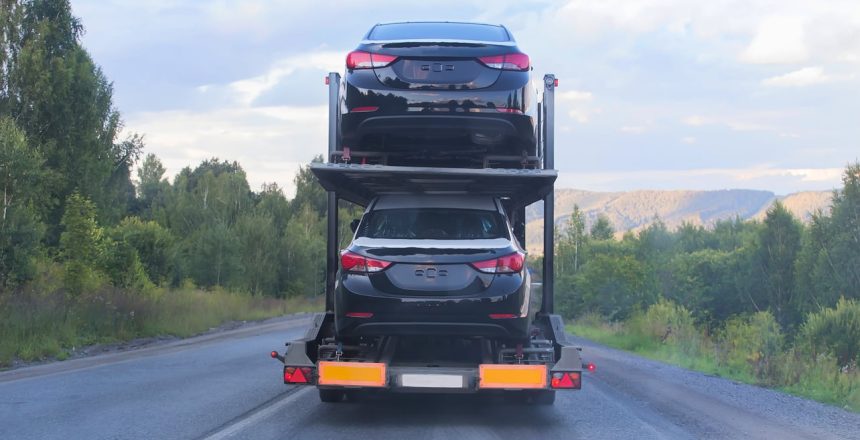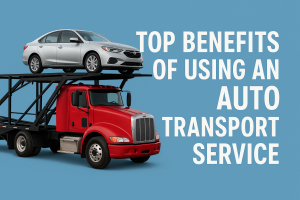There are 3 basic types of vehicle carrier you can use to transport your car. Here’s how they work, their advantages, and their disadvantages.
Choosing the right vehicle transportation method starts with choosing how you want your car to be carried. Do you want it entirely enclosed in a container? Can you save money by hiring an open-air trailer? Here’s what you need to know about the auto transportation options and what they mean for your vehicle.
Key takeaways:
- Overview of open, enclosed, and flatbed carriers
- Pros and cons of each carrier type
- Peace of mind with Mercury Auto Transport
Open auto carriers
Open auto transport carriers are trucks that are used to haul vehicles, as the name says, openly, with no walls around the carrier. They are the trailers you see on the roads every day with cars stacked seemingly precariously on the back of their rigs. They are the most common and easiest-to-find carriers in the transportation industry, moving roughly 90% of all auto freight each year.
Open car carriers transport nearly every type of vehicle, from classic cars to salvage cars, but they’re best for shipping standard models and used cars that don’t typically need as much protection.
There are three main types of open car shipping carriers:
- Two-level, multi-car carrier: These are the most popular and can carry the most vehicles.
- Single-level, multi-car carrier: This type of carrier is frequently used to haul sport or luxury automobiles, or for expedited deliveries.
- Dually truck with single-level tow trailer: This heavy-duty, dual-rear-wheel pickup truck with a trailer is mostly used for short distances and local deliveries.
There are pros and cons for shipping open carry that you should consider based on the type of vehicle you need to ship.
Pros
- Cheaper than enclosed carry: Open carriers can be much cheaper than enclosed. One study found a $421 difference between the average price of open and closed carriers. One reason for this price difference is that an open carrier can haul up to 10 vehicles at a time. The trailers are also lighter, which saves on fuel costs, and there are so many of these trucks on the same routes that carriers compete and bid down the prices.
- There are more open carriers on the road. This makes it easier to find a reliable shipper near you and book your preferred shipping and arrival times.
- Nationwide shippers. These trucks routinely cross 3,000 miles in a week or two. They do nationwide transportation and service local areas.
Cons
- Open-air trailers expose vehicles to weather, dirt, and debris: Your car may arrive in need of a wash since it isn’t individually concealed.
- Security: Since the cars are exposed, they’re more vulnerable to damage and break-ins. Always remove your valuables from your car before shipping open carry.
- Longer wait times: Since open carry trailers can hold up to 10 vehicles at once, it may take longer to get your car back while you wait for the driver to drop off other cars.
Open car carriers are by far the most popular method of auto transport. They are the cheapest option, good for shipping a standard model of car, but they don’t offer the best protection from the elements or crime.
Enclosed auto carriers
Enclosed auto carriers, as the name implies, ship vehicles inside a protective transport container. They are the best solution for moving high-value vehicles safely and discretely — like first-class for your car. Soft-sided and hard-sided trailers are available when shipping enclosed.
There are two types of enclosed carriers:
- Multi-car enclosed trailers: These trailers can hold up to seven cars and are usually the least expensive type of enclosed carrier.
- Two or one-trailers: These are more expensive and often used for luxury, antique, and rare vehicles.
As with an open car carrier, there are pros and cons to shipping with an enclosed carrier.
Pros
- Protection from outside elements: Your car is enclosed, so it will be protected from weather, road debris (like rocks), and dust.
- Secure and protected: Because your vehicle is enclosed in a container, it’s much less vulnerable to thieves. Also, enclosed carrier drivers are more experienced in the care of high-end vehicles.
Cons
- Price: Enclosed carriers are 30%-65% more expensive than open carriers because They carry fewer cars at once and are heavier, meaning they’re less fuel-efficient.
- Slower transport: Enclosed trailers are typically slower than open-air trailers because there isn’t as high of a demand, so there are fewer of them available at any given time.
If your car was built before 1970, can go zero to sixty in under three seconds, or is something James Bond would drive, you should opt for an enclosed carrier. These trailers were made to keep vehicles in tip-top shape, which justifies the higher price.
Flatbed carriers
Flatbed carriers are trucks with a flat-level bed with no sides or roof. They are the least used type of auto carrier, more expensive than other options, and require longer wait times for shipping. So, why would anyone opt for this option? It tends to be a niche method used for unique vehicles that can’t be shipped on regular open carriers.
Flatbed carriers are used to ship:
- Heavy construction equipment
- Tow trucks
- Oversized stock production vehicles
- Extended cargo vans
- Large pickup trucks
- Small motor homes
- Inoperable and damaged vehicles
If you want to ship a heavy-duty pickup truck like a Ford F-350, it may not fit on a standard auto carrier. Most large trucks, because of their height, won’t fit on the bottom row of an open transport truck and might hit a low overpass if they’re placed on the top rack. Their heaviness also makes them less attractive to standard carriers due to fuel consumption.
The pros and cons to shipping your vehicle on a flatbed carrier are as follows.
Pros
- Niche shipping: This is the best option if you’re shipping a vehicle that can’t fit on another carrier, like a heavy-duty pickup truck.
- Drivers with specialized skills: Flatbed carriers possess special driving and maneuvering skills for carrying unique freight, so your vehicle will be in capable hands.
Cons
- Price: As mentioned earlier, flatbed carriers are the most expensive option and the price is determined by weight, size, condition of the vehicle, and distance. Short routes range from $1.00 to $2.00 per mile and long routes range from $0.60 to $1.50 per mile.
- Restricted carry load: Flatbed transporters are usually only able to carry one to three vehicles because they are used to transport oversized and/or non-working/damaged vehicles. Therefore, instead of splitting mileage with several cars, you are usually responsible for the entire fee.
Pick Mercury Auto Transport for peace of mind
Whatever type of vehicle shipping you choose; Mercury Auto Transport can help you find the right carrier for the best price.
Mercury Auto Transport is a nation-wide, full-service auto shipping company that connects vehicle carriers with shippers anywhere in the country. Our process is transparent and trustworthy, and we’re always working to get you the best deal. Call us today for a quote!






